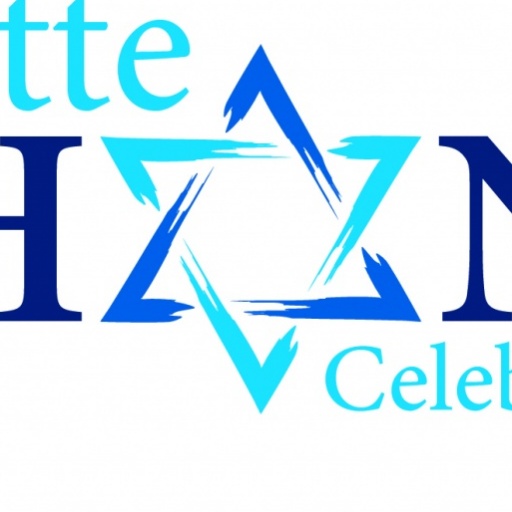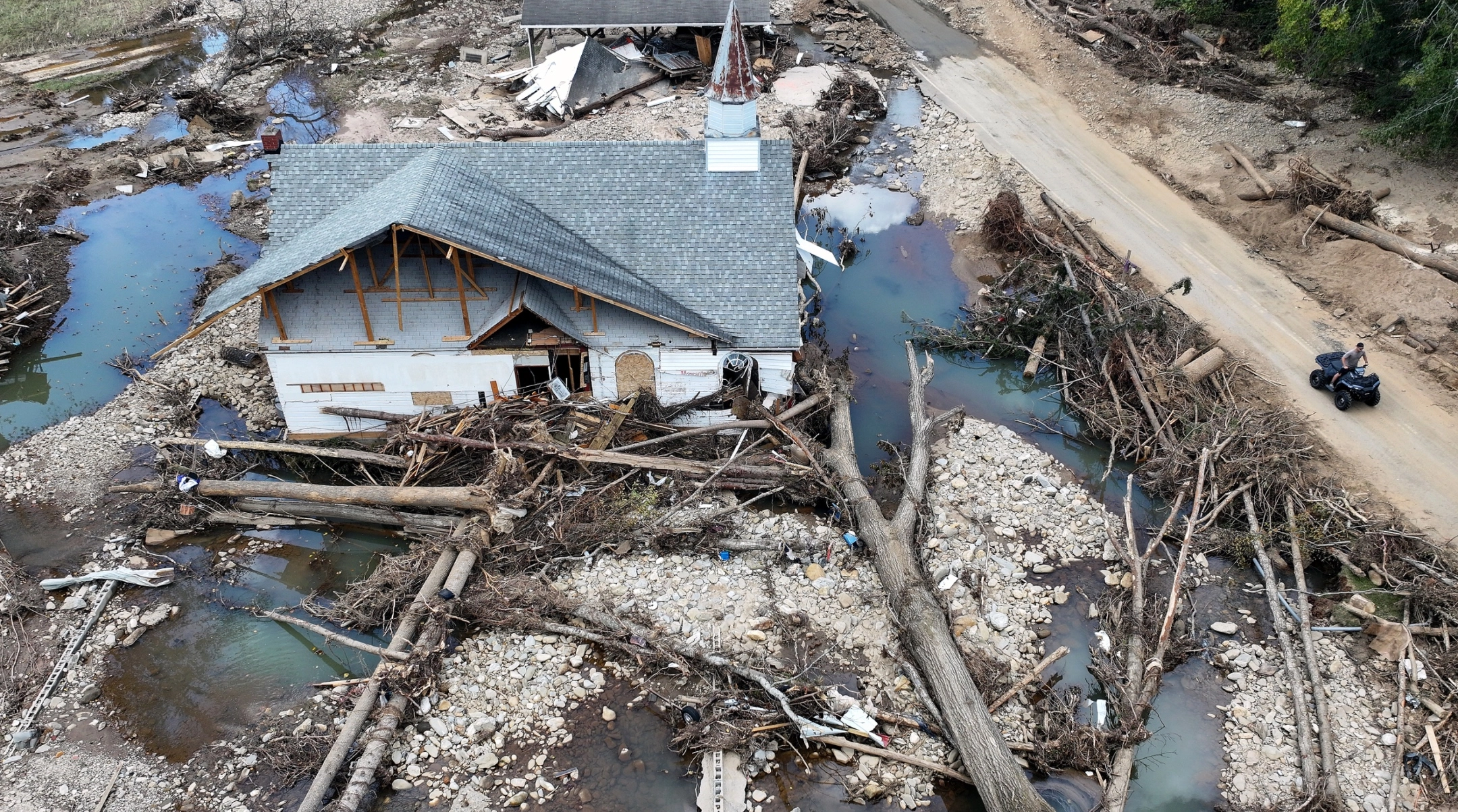By Shira Firestone
When Hurricane Helene brought heavy rains, causing widespread flooding and landslides to Western North Carolina last month, it left a trail of destruction that transformed idyllic mountain communities into disaster zones overnight. Floodwaters submerged entire towns, severing lifelines to essential services. Thousands faced power outages projected to last weeks or even months, and the region faced a grim tally of lost lives and an agonizing search for those still missing. The storm’s impact rippled far beyond the immediate area, creating a profound sense of urgency across the state to respond. The Jewish community of greater Charlotte mobilized swiftly, with both individuals and organizations stepping in to support our Western North Carolina neighbors.
The immediate concern was locating missing loved ones, a task complicated by widespread power outages, road closures, and disrupted communication. Rabbi Bentzion Groner of Chabad of Charlotte learned of the devastation after turning his phone on Saturday night, following Shabbat. When he finally reached Rabbi Shaya Susskind of Chabad Asheville, he found him gravely concerned about the welfare of their community members, fearing the worst with no way to communicate or know if they were safe.
Chabad mobilized quickly, reaching out to Matzil, a Jewish relief organization based in New Jersey and Florida, which arrived within two days equipped with off-road vehicles, chainsaws, and satellite phones — a lifeline for a community cut off from essential services. Matzil’s team, trained in search and rescue, worked tirelessly to locate missing individuals. Chabad of Charlotte served as the command center for these efforts, as Asheville Chabad’s internet access was initially down. Chabad of Charlotte hosted a website where people could enter the names and addresses of missing loved ones. The Matzil team, with its specialized equipment and expertise, navigated through blocked roads, located the missing, and reported back to anxious families — bringing a sense of relief during an incredibly uncertain time. “Not all of the stories of search and rescue had a happy ending, but we are relieved to report that all of the members of our community have been located and are safe,” said Rabbi Groner. While the rescuers were on their way to Western North Carolina, Rabbi Groner had already filled a cargo van with bottled water, food, fresh wipes, and a generator. By 6 p.m. on Sunday, three hundred hot meals had been served, providing much-needed relief to those in need.
Meanwhile, across Charlotte, synagogues and Jewish organizations began independently gathering essential supplies like water, food, and toiletries to support those affected by the disaster. Although many were eager to help, state and local officials encouraged those offering aid to work through official channels to ensure that relief efforts were coordinated and reached those in need efficiently and safely.
One of those channels was Myers Park United Methodist Church. Temple Beth El, drawing on its long-standing relationship with the church, contributed an entire pallet of water to their relief efforts. Thousands of pounds of water were delivered to affected areas, some of which reached Congregation Beth HaTephila in Asheville, where it helped support their outdoor Rosh HaShanah service.
As formal relief efforts concentrated on getting supplies to the hardest-hit areas, local community members in Charlotte turned their focus to supporting those displaced by the storm. Synagogues opened their doors for High Holiday services, providing not only spiritual comfort but also much-needed stability during uncertain times. Community members offered their homes to evacuees — some for a few days, others for much longer.
While supplies were and continue to be essential for many cut-off communities, it was clear from the outset that long-term recovery would require sustained financial support. Financial resources could be directed to those organizations best positioned to assess and address the evolving needs on the ground.
Jewish Federation of Greater Charlotte (JFGC) was quick to respond Federation is uniquely positioned to provide an avenue for donations, drawing on its experience from past crises, including establishing a COVID Relief Fund to support those impacted by the pandemic and the Israel Emergency Fund after the attack by Hamas on Israel last year. Federation CEO Adam Kolett called an emergency meeting on Sunday night, after the storm had barely passed, convening leaders from Jewish organizations in Charlotte to begin assessing needs and responding as a community. One of the first actions taken was the establishment of an Emergency Relief Fund, providing a unified channel for financial support. By Monday morning, this fund was operational, and to date, over $125,000 has been raised.
JFGC has pulled together an ad-hoc committee that includes representatives from various local agencies to help assess ongoing needs and make recommendations for how best to allocate the funds raised through the Emergency Relief Fund. Due to proximity and relationships in the impacted areas, Federation remains in close contact with local volunteer and professional leaders, offering support and assessing the most pressing needs.
Additionally, JFGC is serving as a close partner to the Jewish Federations of North America (JFNA) emergency rebuilding efforts. The JFNA emergency committee has already secured equipment and provided grants totaling $200,000. From these grants, each agency and synagogue will have discretionary funds to distribute to individual Jewish families as needed. In addition, JFNA provided 11 Starlink internet packs to ensure connectivity and allow each institution to continue operations. Each organization received at least one portable toilet, enabling them to resume functional operations. Grants have also been made available for portable air conditioning units and generators where needed. These funds are made possible through JFNA’s Hurricane Relief Fund, launched after Hurricane Helene and now includes support for those impacted by Hurricane Milton.
JFGC is also focused on coordinating volunteer efforts. It has identified vetted volunteer opportunities, including working with North Carolina Voluntary Organizations Active in Disaster (NC VOAD), a consortium of nonprofits managing a warehouse in the Charlotte-Mooresville area that needs daily volunteers, and NECHAMA, which will organize volunteers on behalf of the Jewish community to support Western North Carolina clean-up efforts. Federation is serving as the central resource, consolidating information on its website so that community members have a single, reliable source for updates and opportunities to help. As larger group opportunities become available, Federation plans to organize day trips for up to 50 volunteers, emphasizing their role in supporting both immediate and long-term recovery in Western North Carolina.
Kolett says, “Federation exists in order to respond to our community’s most acute needs, and I am proud of how Jewish Charlotte jumped into action and remains committed to relief efforts. We all love our mountains, and being involved in their rehabilitation is not only our Jewish imperative, but it is something we will remember forever.”
Jewish Family Services (JFS) and the Levine Jewish Community Center (LJCC) are just two examples of organizations staying in close contact with their counterparts in Western North Carolina, helping to communicate ongoing needs. Additionally, both JFS and LJCC are making plans to send staff from Charlotte to provide direct support to their peer agencies when the time is right. While many organizations have already stepped up, the efforts mentioned here represent just a portion of the larger, ongoing response.
At the heart of these efforts, however, is the entire Charlotte community. Through the collective actions of individuals — donating supplies, contributing to the relief fund, and offering their support — we have been able to respond to this disaster. This crisis is deeply personal, as so many of us have a special connection to the mountains and the people of Western North Carolina.
The work is far from over. As immediate needs are addressed, the focus is shifting toward long-term stability and resilience for those affected by Hurricane Helene. This marks the beginning of a complex journey to rebuild lives and communities. With deep-rooted connections to Western North Carolina and a steadfast commitment to its recovery, the Jewish community of Charlotte will continue to stand by those impacted by this unprecedented disaster.


